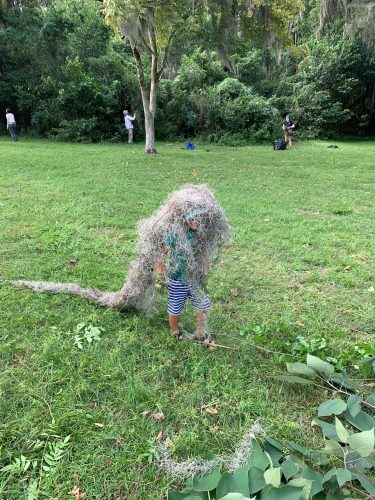Written by: Roxanne Hoorn
The Florida Museum of Natural History (FM) is promoting biodiversity and conservation efforts around the world, but staff and students are making sure we don’t forget about our own precious natural areas, right here on the University of Florida campus.
“I mean, here we are, a natural history museum. We are supposed to be trying to promote conservation worldwide, the study of biodiversity worldwide, and if we can’t save a woodland that is right in the center of our campus, right across from the museum, then why are we going all over the world telling people that they should do it? To me, it’s sort of a metaphor for the situation we find ourselves in globally,” explains Dr. Doug Soltis, Distinguished Professor at the Florida Museum and the Department of Biology at the University of Florida.
The woodland Dr. Doug Soltis is referring to is the well-loved and highly trafficked McCarty Woods, a 2.9-acre expanse of hardwood forest, home to numerous plant and animal species, including a National Champion one-flowered haw (Crataegus uniflora

Muench), the largest of its species, as recorded in the National Register of Big Trees. The area is known as an integral biodiversity hotspot to campus, a natural teaching site and research laboratory, as well as an essential natural respite and defining feature of the University of Florida’s campus. Dr. Pamela Soltis, Director of the UF Biodiversity Institute and Distinguished Professor and Curator, comments, “So many of the missions of the university are taking place right there in this little patch of forest.” Due to McCarty Woods’ ecological and social importance, it was declared a conservation area in 2000.
Despite this title, the UF Campus Master Plan for 2020-2030 states that the majority of McCarty Woods would be refined down to one acre in order to make room for the development of an educational building. The development plans were met with an outpouring of protest from faculty and students alike. Due to growing pressure from faculty, students, and beyond, the threat of destruction of McCarty Woods has been, at least temporarily, extinguished.
Several of those who acted to protect the woods are taking further action, working to improve the accessibility and quality of the woods now and for the future. Numerous invasive species removals have already taken place, and the plans for McCarty Woods don’t stop there. The development of engaging events and classes for the whole community is underway. Future events will include guided nature walks, plant identification, bird watching, insect identification, and more. The improvement of trails and informative signage, including recognition of indigenous names and knowledge, is another primary goal of these ambitious plans to enhance the use and experience of McCarty Woods for all.
You can be a part of these efforts by volunteering (details below) or donating now! Your gift will help fund signage, trail maintenance, native species reintroduction, community events, and more!
The success of this project will not only impact the beloved McCarty Woods, but can set an example for the care and concern for conservation areas around campus. Dr. Lucas Majure sums this up well. “Making McCarty a model that then can be applied more broadly across campus sets up a very strong awareness of these natural areas we have and the diversity housed right here on campus, which is quite phenomenal.”
All are invited to join the next clean-up!
Saturday, November 20, 2021
9:00-11:30 a.m.
Meet at 9:00 am at the McCarty Hall Parking area https://taps.ufl.edu/parking-info/parking-map/ just north of the woods. We will give a brief overview before we start so that no natives are pulled out by mistake.
Please come for whatever time you can spare. We have a lot to do. In addition to removing more invasive plants we have new signs for the kiosks (and the kiosks need to be cleaned), plus new trails to mark and trees to tag.
Dress appropriately and bring water and gloves if you have them, and maybe a personal garbage bag for invasive plants. We will again bring water, gloves, garbage bags, loppers, small hand saws, and doughnuts!
Masks are encouraged; even though we will be outside, you might be working close to others depending on turn-out; we will bring extra masks.
Follow McCarty Woods on twitter-SoltisLab@UF (check out the McCarty Woods Plant of the Week!)
